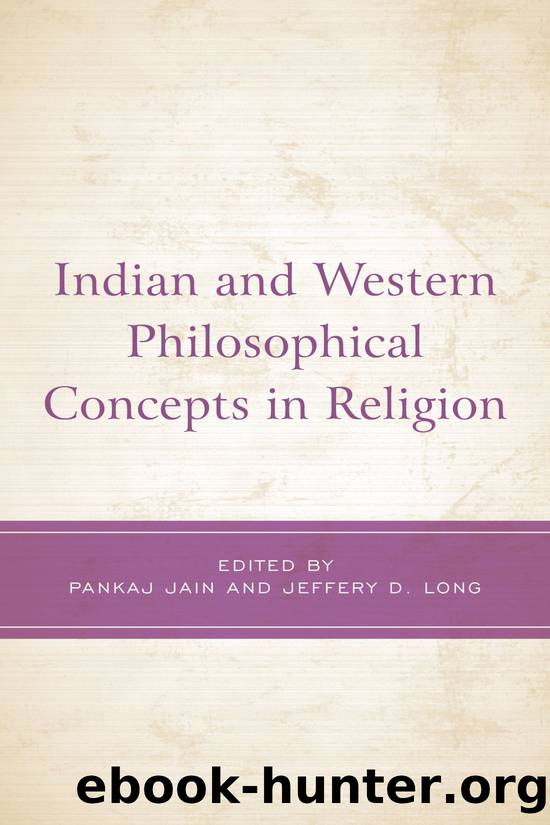Indian and Western Philosophical Concepts in Religion by Pankaj Jain

Author:Pankaj Jain
Language: eng
Format: epub, pdf
ISBN: 9781793623164
Publisher: Lexington Books
Published: 2022-12-13T00:00:00+00:00
Concluding Remarks
Endings are tricky business, especially when dealing with a hermeneutical dialogue, which is always in a state of flux; it never truly ends or comes to a definitive conclusion. It continues to unfold, develop, and transform those involved in the dialogue, even though the participants might not be directly affected because the various texts considered are used in place of deceased authors who now communicate through their texts. Their ideas about play have been exchanged, but the result might not be recognized for some time. This line of argument implies that a hermeneutical dialogue is not intended to lead to an end, a status of absolute objectivity, or a definitive defensible position. A hermeneutical dialogue is more akin to an ideal of openness, empathy, and mutual respect. This is something that seems to be worth the effort to aspire to accomplish. But what did the dialog in this paper accomplish?
After looking at the notion of play in the BhÄgavata PurÄá¹a and briefly showing its importance to major thinkers such as Åaá¹kara and RÄmÄnuja to suggest its importance in the Indian context, the positions of three western thinkers were presented before turning to KavirÄja, a representative of Indian hagiographical authorship. After engaging in a hermeneutical dialogue with the western representatives, several aspects of KavirÄjaâs theory of play were identified that could be fruitfully used by the western theorists to enhance their own concepts of play. These identified elements of KavirÄjaâs theory of play that might prove useful to the three western thinkers and their conception of play include its subjunctive mood, liminal nature, the feeling of sameness created by love, renewal, spiritual transformation, emotional absorption in play, no rigid distinction between work and play, its sanctity, blissful aspect, and powerful feature. Based on these features from KavirÄjaâs conception of play that could make a contribution to western conceptions of play, it is safe to affirm that the hermeneutical dialogue did not result in a âfusion of horizons.â It is, however, anticipated that the dialogue manifested a spirit of sharing, an inducement to seek meaning, reaching a cross-cultural level of accommodation, and an embrace of KavirÄjaâs insights.
Employing a hermeneutical dialogue does not lead to definitive interpretations or dialogical exchanges. But there is an excessiveness associated with such an encounter with respect to meaning. If the hermeneutical dialogue is successful, the meaningfulness of the exchange emerges in the area between the participants. This excessive nature of a hermeneutical dialogue also involves a recognition that participants have presuppositions, pre-understandings, prejudgments, and prejudices. There also needs to be a mutual acknowledgment that a hermeneutical dialogue is incomplete, and there is a need to continue it after taking a pause and considering what kind of exchanges took place. The briefly concluded four-way dialogue on the notion of play enables a reader to recognize that an Indian author, who is neither a cultural historian, anthropologist, nor postmodern thinker can make a useful contribution to a particular problem in western thought and provide something new on the topic of play that westerners should consider when they think and write about play.
Download
Indian and Western Philosophical Concepts in Religion by Pankaj Jain.pdf
This site does not store any files on its server. We only index and link to content provided by other sites. Please contact the content providers to delete copyright contents if any and email us, we'll remove relevant links or contents immediately.
Getting It, Then Getting Along by L. Reynolds Andiric(652)
Religion and Politics Beyond the Culture Wars : New Directions in a Divided America by Darren Dochuk(575)
Global Justice, Christology and Christian Ethics by Lisa Sowle Cahill(428)
Positive Psychology in Christian Perspective: Foundations, Concepts, and Applications by Charles Hackney(353)
Forgiveness and Christian Ethics by Unknown(347)
Douglas Hamp The First Six Days by Unknown(296)
The Horrors and Absurdities of Religion by Arthur Schopenhauer(271)
Insurgency, Counter-insurgency and Policing in Centre-West Mexico, 1926-1929 by Mark Lawrence(266)
Middle Eastern Minorities: The Impact of the Arab Spring by Ibrahim Zabad(249)
Christian Martyrdom and Christian Violence by Matthew D. Lundberg;(242)
The Oxford Handbook of Greek and Roman Mythography by R. Scott Smith;Stephen M. Trzaskoma;(235)
Beyond Heaven and Earth by Gabriel Levy(232)
God and Eros by Patterson Colin;Sweeney Conor;(230)
The Bloomsbury Reader in Christian-Muslim Relations, 600-1500 by David Thomas;(223)
Autobiography, Volume 2: 1937-1960, Exile's Odyssey by Mircea Eliade(215)
Witches: the history of a persecution by Nigel Cawthorne(211)
Cult Trip by Anke Richter(209)
An Introduction to Kierkegaard by Peter Vardy(198)
The Global Repositioning of Japanese Religions by Ugo Dessi(195)
